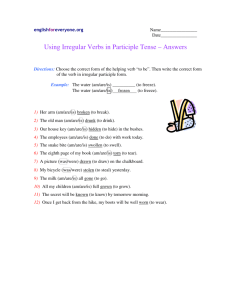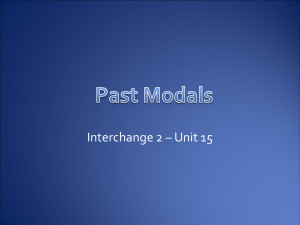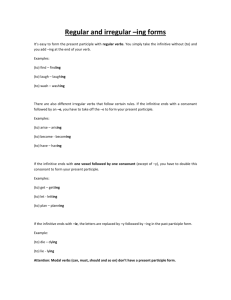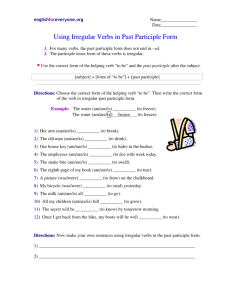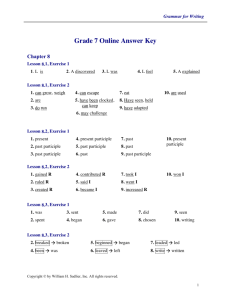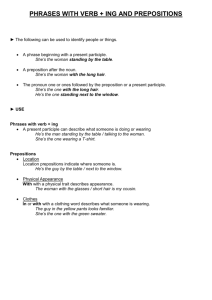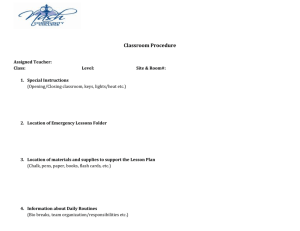VERBS – 4 Principal Parts
advertisement
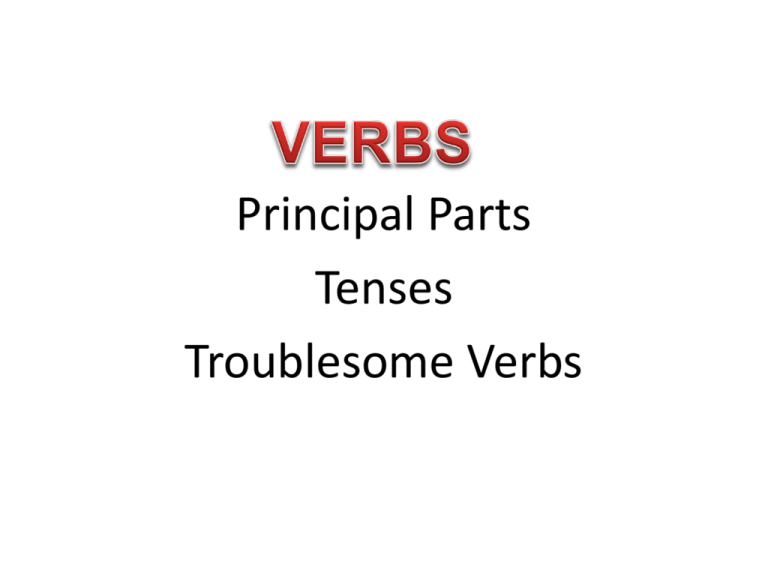
Principal Parts Tenses Troublesome Verbs 1. Present - base form 2. Present Participle 3. Past 4. Past Participle look (am/is/are) looking looked (has/have/had) looked • Add -ing to form the PRESENT PARTICIPLE raise + ing = raising talk + ing = talking • Add –d or –ed to form PAST and PAST PARTICIPLE raise + d = raised; (has/have/had) raised talk + ed = talked; (has/have/had) raised • • • • jump Present (am/is/are) jumpingPresent Participle jumped Past (has/have/had) jumped Past Participle talk travel You do: enjoy stop receive argue wish remember • Also add –ing to form PRESENT PARTICIPLE drink + ing = drinking • BUT … forms the PAST and PAST PARTICIPLE by changing the present/base form altogether drank = PAST (has/have/had) drunk = PAST PARTICIPLE • • • • break (am/is/are) breaking broke (has/have/had) broken choose catch eat bite Present Present Participle Past Past Participle You do: freeze know drive bring 1. The judges have (chose, chosen) the finalists. 2. James (walk, walked) to the library today. 3. My favorite jeans have (began, begun) to wear out. 4. Someone (broke, has broke) that valuable vase. 5. Have you (began, begun) studying for the test? 6. We have (ate, eaten) already. 7. The snow cone has (froze, frozen) my tongue. 8. Sue has (broked, broken) the record for the long jump event. 9. The team captains (chose, chosen) their players carefully. 10. Have you (chose, chosen) a topic yet? 11.Have you (brung, brought) your application to the office? 12. He has (drank, drunk) only water at practice. • The principal parts of a verb are: 1. present/base 2. present participle 3. past 4. past participle The principal parts of a verb help create the six tenses. • A regular verb forms its present participle by adding –ing and its past and past participle by adding –d or –ed to the present/base form. • An irregular verb forms its present participle by also adding –ing but forms the past and past participle by changing the present/base form all together. Sit or Set? Rise or Raise? Lie or Lay? Sentence Practice 1. 2. 3. 4. 5. 6. 7. 8. Today, I want to (lie, lay) in the sun. Yesterday, I (lie, lay) I the sun. The girl (lay, laid) her paper on the table. The teacher has (laid, lain) the pen on her desk. The student (raised, rose) at four o’clock. (Raise, Rise) the window shade. We always (set, sit) the boxes on the floor. The boy (set, sat) in his favorite chair. 9. The student (raised, rose) his hand. 10. Mother (raised, rose) the shade in the kitchen. 11. Our neighbor (sat, set) his garbage can outside. 12. Sally has (lain, laid) under the tree all day. 13. Julio had (sat, set) at the park until dark. 14. The girl had (rose, risen) to the occasion. 15. The coach (set, sat) the trophy on the shelf. 16. Dad is (laying, lying) on the couch in the den. 17. The dog likes to (lie, lay) on the rug. 18. The class (raised, rose) the question again.
